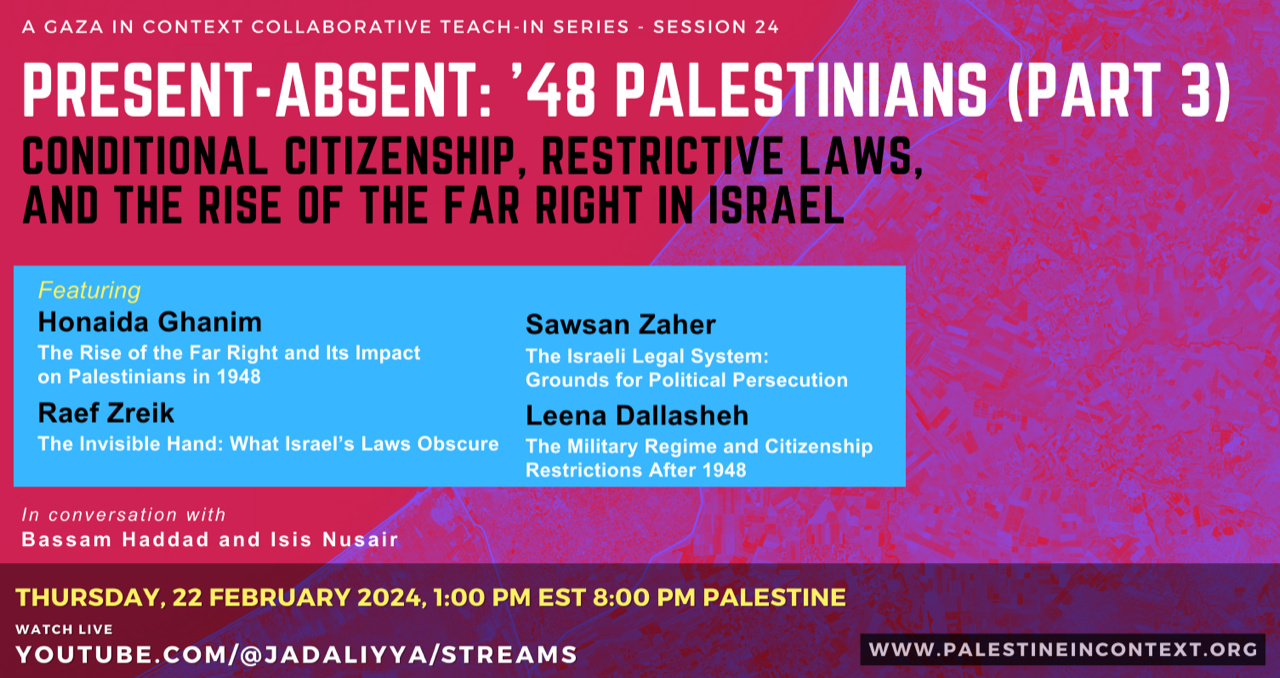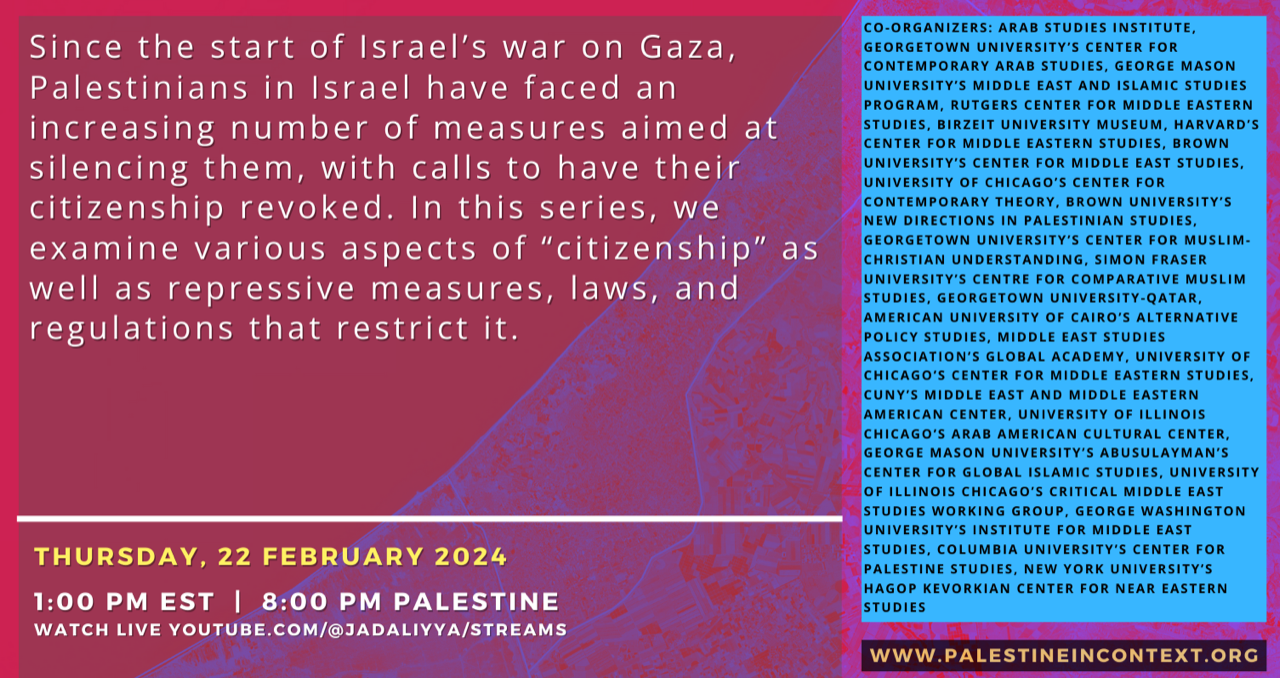Teach-In Session 24
Since the start of Israel’s war on Gaza, Palestinians in Israel have faced an increasing number of measures aimed at silencing them, with calls to have their citizenship revoked. In this series, we examine various aspects of “citizenship” as well as repressive measures, laws, and regulations that restrict it.
Speakers
Honaida Ghanim is the General Director of The Palestinian Forum for Israeli Studies (MADAR) in Ramallah. She received her Ph.D. in 2004 from the Hebrew University with distinction (Suma Cum Laude), and lectures at various Palestinian universities. She has published various articles and studies in the fields of political and cultural sociology and gender studies. Her book, Reinventing the Nation: Palestinian Intellectuals in Israel (in Hebrew), was published by the Hebrew University Magnes Press in 2009. She was the editor of On Recognition of the “Jewish State” (in English), published by MADAR in 2014, and a co-editor of On the Meaning of a Jewish State (Arabic), published by MADAR in 2011. She was also the chief editor of the Qadaya Israelieh Journal (2000-2011). Since 2009 she has been the chief editor of MADAR’s Strategic Report.
Raef Zreik is a jurist and a scholar, an expert in political philosophy and the philosophy of law, a lecturer on property law and the theory of law at Ono Academic College, academic co-director of the Minerva Humanities Center at Tel Aviv University, and a senior research fellow at the Van Leer Jerusalem Institute. Dr. Zreik holds first and second degrees in law from the Hebrew University of Jerusalem. He also has an LLM from Columbia Law School and a PhD from Harvard Law School. His doctoral dissertation dealt with Kant’s concept of legal right and the transition from questions of ethics to questions of law. Dr. Zreik was a guest lecturer at Georgetown Law and at the Cogut Institute for the Humanities at Brown University. His research addresses questions pertaining to legal and political theory and issues of citizenship and identity, Zionism, and the Palestinian question. His many publications in these fields have appeared in anthologies and in legal and interdisciplinary journals. At the Van Leer Jerusalem Institute, Dr. Zreik is involved in several projects and teaches in
Intellectual Journeys, a program for young intellectual leadership.
Sawsan Zaher is A Palestinian human rights lawyer based in Haifa. Sawsan manages her private law firm in Haifa specializing in human rights; she serves as the legal advisor for the Civil Society Coalition for Emergency in Arab Society; she also she serves as an instructor at the Human Rights Clinic in Tel Aviv University.
During her 20 years experience in the field of human rights and international law, Sawsan litigated major landmark cases before the Israeli Supreme Court and other courts on behalf of Palestinian on both sides of the Green Line in several fields of human rights. Up until August 2021, she served as the deputy general director and senior lawyer at Adalah Legal Center (Haifa) where she worked for 16 years. She was selected for several fellowships, including: Young Global Leader by the World Economic Forum (2015); Yale World Fellow at Yale University (2013); Public Interest Law Fellow at Columbia University in NYC (2008) and others.
Leena Dallasheh is an independent scholar. Her research focuses on the history of Palestine/Israel, with a particular interest in Palestinians who became citizens of Israel in 1948. She is currently finishing a manuscript on the social and political history of Nazareth from 1940 to 1966, tracing how Palestinians who remained in Israel in 1948 negotiated their incorporation in the state, affirming their rights as citizens and their identity as Palestinian. Her article “Troubled Waters: Governing Water and Struggling for Citizenship in Nazareth” appeared in IJMES 47 (2015). She also published articles and reviews in JPS and edited collections. She received her PhD in the joint History and Middle Eastern and Islamic Studies program at NYU. Before coming to NYU, she received a law degree from the Hebrew University in Jerusalem.
Moderators
Isis Nusair: Professor of Women’s and Gender Studies & International Studies at Denison University. She is the co-editor with Rhoda Kanaaneh of Displaced at Home: Ethnicity and Gender Among Palestinians in Israel, and translator of Ever Since I Did Not Die by Ramy Al-Asheq. Her upcoming co-edited anthology with Barbara Shaw examines feminist collaborations in teaching and learning. She is completing two book projects focusing on Iraqi women refugees in Jordan and the USA, and refugees from Syria in Germany. Isis is the co-writer/director with Laila Farah of the one-woman performance, Weaving the Maps: Tales of Survival and Resistance. She is currently researching the body of war in Syrian TV series post 2011. She serves on the editorial committee of the International Feminist Journal of Politics. She previously served on the editorial committee of MERIP and as a researcher on women’s human rights in the Middle East and North Africa at Human Rights Watch and at the Euro-Mediterranean Human Rights Network.
Gaza in Context Collaborative Teach-In Series
We are together experiencing a catastrophic unfolding of history as Gaza endures a massive invasion of genocidal proportions. This accompanies an incessant bombardment of a population increasingly bereft of the necessities of living in response to the Hamas attack in Israel on October 7. The context within which this takes place includes a well-coordinated campaign of misinformation and the unearthing of a multitude of essentialist and reductionist discursive tropes that dehumanize Palestinians as the culprits, despite a context of structural subjugation and Apartheid, now a matter of consensus in the human rights movement.
The co-organizers below are convening weekly teach-ins and conversations on a host of issues that introduce our common university communities, educators, researchers, and students to the history and present of Gaza, in context.
Co-Organizers: Arab Studies Institute, Georgetown University’s Center for Contemporary Arab Studies, George Mason University’s Middle East and Islamic Studies Program, Rutgers Center for Middle Eastern Studies, Birzeit University Museum, Harvard’s Center for Middle Eastern Studies, Brown University’s Center for Middle East Studies, University of Chicago’s Center for Contemporary Theory, Brown University’s New Directions in Palestinian Studies, Georgetown University’s Center for Muslim-Christian Understanding, Simon Fraser University’s Centre for Comparative Muslim Studies, Georgetown University-Qatar, American University of Cairo’s Alternative Policy Studies, Middle East Studies Association’s Global Academy, University of Chicago’s Center for Middle Eastern Studies, CUNY’s Middle East and Middle Eastern American Center, University of Illinois Chicago’s Arab american cultural Center, George Mason University’s AbuSulayman’s Center for Global Islamic Studies, University of Illinois Chicago’s Critical Middle East Studies Working Group, George Washington University’s Institute for Middle East Studies, Columbia University’s Center for Palestine Studies, New York University’s Hagop Kevorkian Center for Near Eastern Studies



